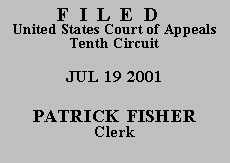

| KEVIN P. SEAVOLT, | No. 01-8016
(D.C. No. 99-CV-191-D) (D. Wyo.) |
The district court dismissed Seavolt's complaint for failure to state a claim upon which relief can be granted. (Doc. 43.) We review the district court's decision de novo, viewing all well-pleaded allegations in the light most favorable to Seavolt. Sutton v. Utah State Sch. for the Deaf & Blind, 173 F.3d 1226, 1236 (10th Cir. 1999).
The Due Process Clause applies to parole proceedings only when the state parole statute creates a legitimate expectation of release. Greenholtz v. Neb. Penal Inmates, 442 U.S. 1, 7, 12 (1978). Wyoming's parole statute provides that the parole board "may grant parole to any person . . . provided the person has served the minimum term pronounced by the trial court less good time." Wyo. Stat. Ann. § 7-13-402(a) (emphasis added). Such permissive language does not give rise to a liberty interest protected by the Due Process Clause. See Bd. of Pardons v. Allen, 482 U.S. 369, 379 n.10 (1987) ("[S]tatutes or regulations that provide that a parole board 'may' release an inmate on parole do not give rise to a protected liberty interest."). Seavolt's due process claims therefore fail. To the extent he also argues that the parole board's decision violated state law, the claims are not cognizable under § 1983. Malek v. Haun, 26 F.3d 1013, 1016 (10th Cir. 1994).
Seavolt's allegations are also insufficient to state an equal protection violation. He alleges that "certain inmates convicted of exactly such disciplinary infractions, absent a criminal conviction for same, have been granted parole in numerous instances" and further that "application of this statute by the parole board has been applied only in instances of prosecution and conviction of such offenses in a court of law." (Doc. 1, at 8-9.) These allegations are too vague and conclusory to establish a violation of equal protection; indeed, Seavolt admitted in his complaint that he could not provide particular case histories to substantiate his claim, as the parole records were not available to him. (Id. at 9.) He does, however, reference one inmate (Wilde) who had been charged with absconding from lawful custody but was nonetheless later granted unsupervised parole. (Id. at 9.) But to state a valid equal protection claim, Seavolt must allege facts sufficient to show that he is similarly situated to Wilde. Crider v. Bd. of County Comm'rs, 246 F.3d 1285, 1288 (10th Cir. 2001). Seavolt does not allege that Wilde had been convicted in a disciplinary hearing, as was Seavolt. Wilde therefore is not similarly situated to Seavolt.
We need not reach most of Seavolt's other arguments on appeal. First, he argues that the district court improperly relied on materials outside the pleadings in resolving this motion to dismiss. We uphold the dismissal on de novo review without reference to these materials. Second, he asserts that the district court improperly resolved issues about Defendants' qualified immunity from damages on a motion to dismiss. We do not reach the immunity questions because we conclude that Seavolt fails to state a claim. See Bisbee v. Bey, 39 F.3d 1096, 1100 (10th Cir. 1994) (holding that we must resolve whether plaintiff states a claim before addressing qualified immunity). Finally, Seavolt argues he should be allowed to amend his complaint to address its deficiencies. He does not explain how he proposes to amend his complaint, and we do not believe he can do so. When, as here, amendment would be futile, there is no requirement that the district court allow a pro se plaintiff an opportunity to amend. See Curley v. Perry, 246 F.3d 1278, 1281-82 (10th Cir. 2001).
We AFFIRM the district court's dismissal of this case.
ENTERED FOR THE COURT
David M. Ebel
Circuit Judge
*.After examining the briefs and appellate record, this panel has determined unanimously to grant the parties' request for a decision on the briefs without oral argument. See Fed. R. App. P. 34(f) and 10th Cir. R. 34.1(G). The case is therefore ordered submitted without oral argument. This Order and Judgment is not binding precedent, except under the doctrines of law of the case, res judicata, and collateral estoppel. The court generally disfavors the citation of orders and judgments; nevertheless, an order and judgment may be cited under the terms and conditions of 10th Cir. R. 36.3.
1.Defendants allege that Antonio Escamilla is not in fact a member of the parole board, but rather the Parole Board Coordinator. (Doc. 10, at 7.) For the purposes of a motion to dismiss, we must accept Seavolt's factual allegations as true. Sutton v. Utah State Sch. for the Deaf & Blind, 173 F.3d 1226, 1236 (10th Cir. 1999). Nonetheless, our decision is not affected by Escamilla's precise position.